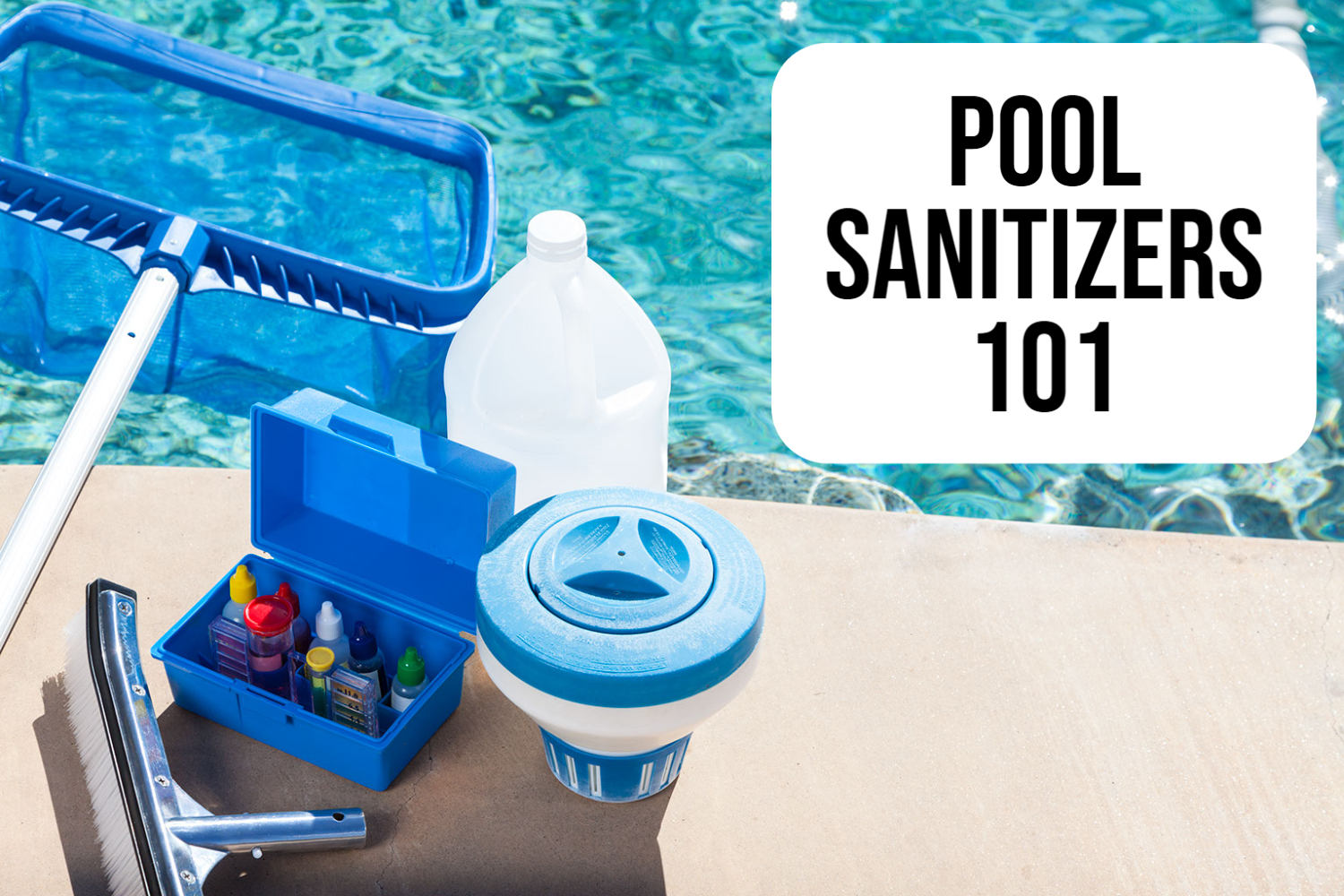Knowing Your Options When it Comes to Pool Sanitizers
November 04, 2020 at 05:01 PM

Having an effective pool sanitizer is a necessary part of owning a pool. A pool sanitizer helps keep bacteria and other contaminants at bay and ensures that your pool is safe for swimming. Let’s look at some of the most common choices.
Primary Pool Sanitizer Options
Every pool needs at least one sanitizer. Each of the four primary pool sanitizers have pros and cons.
1. Chlorine Tablets
Chlorine is a chemical compound that destroys harmful bacteria. It also helps prohibit the growth of algae in pools. Chlorine tablets are dissolvable tabs of chlorine that come in various sizes.
To sanitize your pool water, either place the tabs in a floating chlorine dispenser or an erosion feeder. The tablets dissolve to keep your pool chlorinated and clean. They are relatively easy to use and can help maintain needed residual chlorine levels in between weekly servicing. The downside to this method is that most chlorine is trichlor, which contains cyanuric acid (CYA) that can build up in a pool over time and minimize the effectiveness of chlorine. If you use a floating chlorine dispenser, the chemicals also may not get distributed evenly throughout the pool water as the tablets dissolve.
Chlorine tablets can irritate skin and eyes, so it’s important to take care when handling the tabs and to wash your hands afterwards.
2. Liquid Chlorine
Liquid chlorine is similar to chlorine tablets, but in liquid form that you add directly to your pool’s water. It dissolves much faster and sanitizes more quickly than tablets.
Liquid chlorine doesn’t have a very long shelf-life, and you’ll have to use it quickly after purchasing it. Like the tablets, it is a manual option and requires that you regularly test your pool chlorine levels to avoid over-chlorination and maintain pool water balance.
Chlorine can irritate eyes and skin, and an odor may develop when chlorine levels are off (caused by the creation of chloramine when chlorine interacts with bacteria in your pool water; creating that “chlorine smell”). However, many people prefer liquid chlorine for its ease of use and low cost. As with chlorine tabs, take care when handling liquid chlorine. It’s a good idea to purchase safety equipment like gloves and goggles to keep you protected.
3. Salt Chlorinator
Salt chlorinators take the manual labor out of pool sanitization. They also eliminate many of the concerns associated with over-chlorination. Salt chlorinators work by automatically producing the ideal amount of chlorine from salt and dispensing it into your pool water.
Pool owners add pool salt to the pool water (the purer the pool salt, the better), where it dissolves and turns the pool water into saltwater. The saltwater then runs through the entire filtration system until it enters the chlorine generator which produces chlorine through electrolysis using a low-voltage current. The generated chlorine then sanitizes the pool water. This type of pool sanitizer generally results in silkier water, less skin and eye irritation and fewer unpleasant odors.
4. Bromine
Bromine is a chemical that works much like chlorine. The primary difference is that it’s more stable in warm water than chlorine, so it can be an ideal sanitizer for spas.
Bromine is also less odorous and less irritating than chlorine. However, it’s more expensive and tends to fare better in indoor pools over outdoor pools. It’s also not quite as effective as chlorine at oxidizing contaminants.
Do You Need a Secondary Sanitizer?
Some pool owners opt for a secondary sanitizer to supplement and support their primary pool sanitizer. These secondary sanitizers aid in keeping the pool free of harmful contaminants.
Three popular choices for secondary sanitizers include:
• Mineral Sanitizers
Mineral sanitizers use a combination of natural minerals such as silver and copper to kill harmful bacteria and neutralize algae.
• UV (Ultraviolet Sanitization)
UV sanitizers use ultraviolet light to eliminate chlorine-resistant bacteria.
• Ozone Sanitizers
Ozone sanitizers use chlorine and dissolved oxygen gas to oxidize chlorine-resistant bacteria.
When used in conjunction with your primary pool sanitizer, a secondary sanitizer helps keep your pool water cleaner, balanced and safe.
Keep Your Pool Sanitized
Your pool sanitation system comes down to personal preference. Make sure to have a pool sanitizer in place before you start enjoying your pool. Remember to keep an eye on your pool’s chemical levels using chemical test kits or the Blueriiot Smart Water Analyzer and reach out to your pool professional for help keeping your pool water balanced.